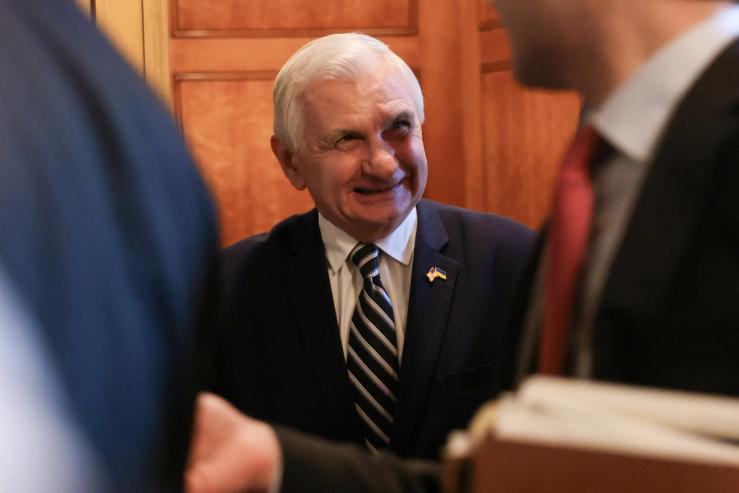The Scoop
Democrats are fighting to preserve states’ ability to regulate AI after President Donald Trump called on Congress to pass a moratorium on state-level action.
Sen. Jack Reed of Rhode Island, the top Democrat on the Armed Services Committee, told Semafor he’s working to keep that moratorium out of the annual defense policy bill, which often attracts unrelated additions due to its must-pass status on Capitol Hill.
“We have to allow states to take the lead because we’re not able to, so far in Washington, come up with appropriate legislation,” Reed said.
The AI regulatory provision has roared back to life after Republicans initially included it in their party-line tax cuts law, only to succumb into internal disputes over whether states should keep their authorities. The moratorium was ultimately removed from that tax legislation on a 99-1 vote; the only vote to preserve it was Sen. Thom Tillis, R-N.C.
Its revival has everything to do with Trump, who said on Tuesday that “overregulation by the States is threatening to undermine this Major Growth ‘Engine.’”
The contents of the final defense policy bill are the product of bipartisan and bicameral talks in Congress.
One person familiar with the negotiations called the AI moratorium a “red line” for Democrats. Reed said he “absolutely” would seek to keep it out of year-end negotiations but added that it’s “one of those issues that probably go up to the leadership after we discuss it.”
Senate Armed Services Committee Chair Roger Wicker, R-Miss., declined to comment on Wednesday.
The White House is considering an executive order preempting state legislation on AI if the moratorium does not pass in the defense bill, according to a person familiar with the matter. However, a White House official said until such an order is announced, “discussion about potential executive orders is speculation.”
The White House has been particularly concerned about state laws slowing down innovation and adoption of AI in the US; it’s blamed behind-the-scenes lobbying by AI safety organizations for some of the bills. Any slowdown could hurt the narrow US lead over China in AI, White House aides believe, and irrational fear of the technology has already done damage.
The planned executive order will likely include provisions allowing the federal government to withhold funding to states that pass AI laws in violation of the order. The federal government could also sue states in an effort to force compliance.
Notable
- Trump’s advocacy for the moratorium puts him on the opposite side of several Republican governors, per National Review.

